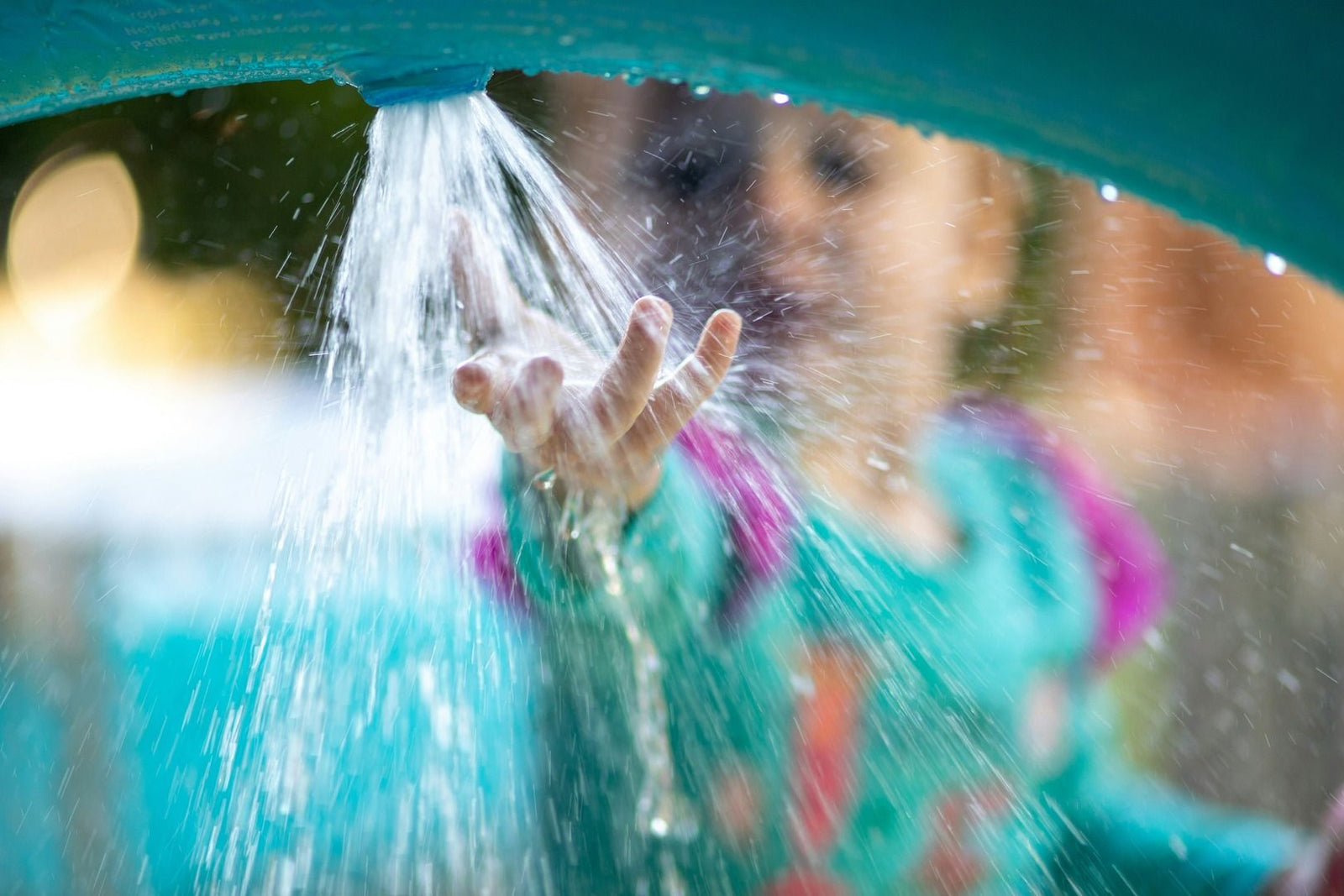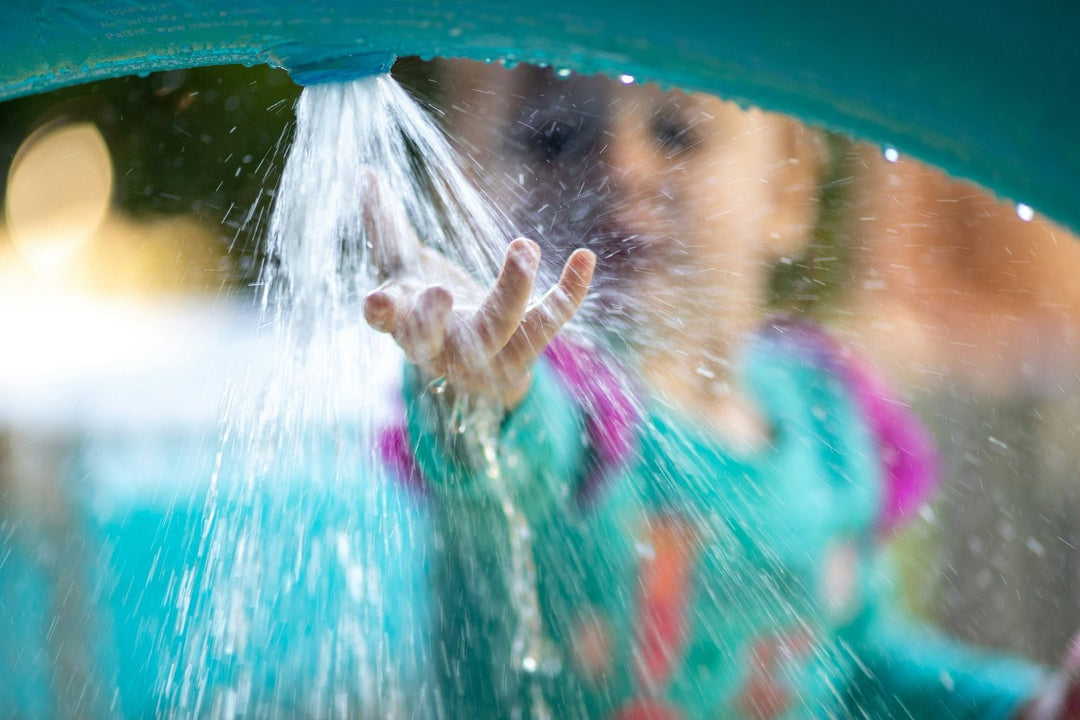Why Water Play is More Than Just Fun: 7 Developmental Benefits for Kids

For many families, splashing in the pool, running through sprinklers, or turning bath time into a mini adventure feels like simple fun. Parents often see it as a chance for kids to burn off energy, cool down on a hot day, or get ready for bed with a quick wash. But behind all the giggles and splashes, water play is doing far more than providing entertainment.
Child development experts agree that water play offers a unique and powerful combination of sensory, cognitive, physical, and emotional growth opportunities. Whether it happens in the backyard with a plastic tub of water, at a local swimming pool, or by the ocean’s edge, water based play taps into a child’s natural curiosity and creativity.
We will explore seven developmental benefits of water play that go far beyond surface level fun. You will see why water activities should have a regular place in your child’s playtime routine and how a few small tweaks can make it easier and more enriching for everyone.
1. Building Sensory Awareness
Water is one of the most versatile sensory materials for kids to explore. It can feel warm or cold, splashy or smooth, heavy or light depending on how it is manipulated. Add in bubbles, sponges, or cups, and you have a whole new dimension of discovery waiting to unfold.
Why it matters
Sensory play is critical for brain development in early childhood. It helps kids build neural connections, enhances their ability to process new information, and even supports language development as they describe what they feel.
For example, a toddler pouring water from one container to another is not just practicing motor skills they are learning about flow, cause and effect, and texture. Sensory awareness also supports emotional regulation. Many parents notice that kids often find water play calming especially after a long day or a burst of overstimulation.
Practical tip for parents
Encourage your child to describe how the water feels. Ask questions like “Is it warm? Is it smooth? Does it splash loudly or softly?” These descriptive conversations boost vocabulary, improve observation skills, and keep kids engaged in mindful play.
You can also add variety by introducing safe items such as ice cubes, floating bath crayons, or sponges. Each new texture adds layers of sensory experience.
2. Enhancing Motor Skills and Coordination
From scooping and pouring to swimming and splashing, water play is a full body workout disguised as fun. Children strengthen both fine and gross motor skills while building coordination and balance.
-
Fine motor skills develop when kids use small muscles in their hands and fingers to squeeze sponges, pick up floating toys, or pour carefully into a cup without spilling.
-
Gross motor skills improve when they run through sprinklers, jump into a pool, or practice floating and paddling with growing confidence.
Why it matters
Strong motor skills set the foundation for future abilities like writing, sports, self care tasks such as dressing, and much more. Water provides just the right resistance to challenge muscles without putting strain on growing bodies. It allows kids to practice movements repeatedly in a low pressure, enjoyable way.
Practical tip for parents
Offer different tools during water play. Plastic cups, strainers, funnels, watering cans, or even kitchen ladles can give children opportunities to practice both precision and strength. Try setting small challenges like “Can you pour the water without spilling a drop?” or “Let’s see who can scoop the most water in one minute.”
3. Boosting Cognitive Development and Problem Solving
Water play doubles as a science lab for curious little minds. Kids experiment with concepts like volume, buoyancy, and gravity without even realizing it.
-
What sinks and what floats?
-
How much water does it take to fill this container?
-
What happens when I add soap or food coloring?
These open ended questions encourage critical thinking and problem solving. Children learn through trial and error, building resilience and creativity as they test out their ideas.
Why it matters
Early exposure to STEM concepts science, technology, engineering, and math through play fosters curiosity and confidence. Water is an ideal medium for hands on exploration because the results are immediate and visible.
For instance, a child building a dam in a sandbox and watching water flow around it is experiencing engineering in action. When they blow bubbles through a straw, they are exploring air pressure and cause and effect.
Practical tip for parents
Turn bath time into a mini science experiment. Challenge your child to predict which toy will float, then test it together. You can also measure and compare volumes with plastic cups, create whirlpools by swirling water, or experiment with dissolving safe ingredients like sugar or salt. These activities not only spark curiosity but also introduce kids to real scientific methods of hypothesizing and testing.
4. Encouraging Social Skills and Cooperation
Water is naturally social. At the pool, on the beach, or even in the backyard, kids are drawn to play with others when water is involved. Whether they are sharing buckets, taking turns on the slip and slide, or teaming up to build a dam in the sand, they are practicing essential social skills.
Why it matters
Learning to share, take turns, and collaborate builds emotional intelligence. Water play often requires negotiation and compromise. For example, one child might say “I’ll use the watering can after you’re done,” which helps them practice patience and communication.
Group water games also foster leadership and teamwork. Even something as simple as racing toy boats or building a sandcastle moat requires children to communicate, delegate tasks, and work together toward a common goal.
Practical tip for parents
If you have more than one child, encourage cooperative water play instead of competitive games. Activities like “Let’s fill this bucket together” can promote teamwork while reducing sibling squabbles. You can also invite friends or neighbors for water play days, giving your child a chance to practice interacting with peers in a relaxed setting.
5. Supporting Emotional Well Being
Have you ever noticed how a warm bath can instantly calm a fussy toddler? Or how splashing in the pool seems to wash away crankiness? Water has an almost magical ability to soothe and reset kids emotionally.
Why it matters
Water play can act as a form of stress relief, helping children process big feelings through movement and sensory engagement. For anxious or highly energetic kids, it provides an outlet for emotions in a safe, constructive way.
It also encourages mindfulness. The rhythmic sound of pouring, the sensation of floating, or the sight of ripples spreading across the water can draw kids into the present moment, much like meditation does for adults. Over time, these calming experiences can teach children how to self regulate and unwind when they feel overwhelmed.
Practical tip for parents
Turn bath time into a calming ritual, not just a hygiene task. Dim the lights, add a few floating toys, or even play gentle music. Afterwards, wrapping them in a soft, absorbent towel can extend that sense of comfort and signal to their body that it is time to rest.
6. Strengthening Confidence and Independence
Learning to interact with water whether through swimming lessons or simple play builds confidence. Every splash, kick, or attempt to float is a small achievement worth celebrating.
Why it matters
Confidence gained in the water often spills over into other areas of life. A child who learns to master new skills in the pool may feel more capable tackling challenges in the classroom or on the playground. Water play also encourages independence. Kids often want to pour their own water, try floating by themselves, or practice swimming without constant help. This independence fosters self esteem and resilience.
Practical tip for parents
Celebrate small wins. If your child puts their face in the water for the first time, blows bubbles, or masters scooping water without spilling, acknowledge it with encouragement. These victories, however small they may seem, create lasting confidence.
For older children, let them take the lead during water play. Allow them to set up games, decide on activities, or even take responsibility for helping younger siblings feel comfortable in the water. This nurtures leadership alongside independence.
7. Encouraging Healthy Habits for Life
Water play lays the groundwork for a lifelong love of swimming, staying active, and connecting with nature. Kids who grow up enjoying the water are more likely to see swimming as fun exercise rather than a chore.
Why it matters
In today’s digital heavy world, it is vital to encourage kids to choose active play over screen time. Water based activities not only keep them moving but also create positive associations with outdoor fun, social interaction, and family bonding.
Swimming is also a life skill that enhances safety and independence. Children who feel comfortable in water at a young age are better prepared for swimming lessons and for situations where water safety is essential.
Practical tip for parents
Make water play a regular family activity. Visit local pools, splash pads, or beaches whenever possible. Even simple backyard play with a sprinkler can establish joyful routines around water. By creating these positive experiences, you are instilling habits that support long term health and well being.
Making Water Play Easy and Enjoyable for Parents
While water play is wonderful for kids, parents know it can sometimes mean wet floors, piles of laundry, or chilly little ones after swimming. A few simple strategies can make things smoother:
-
Set clear boundaries Whether indoors or outdoors, establish where splashing is allowed and where it is not.
-
Keep clean up tools handy Towels, mop, or a bucket nearby can prevent stress after playtime.
-
Have a cozy transition After water fun, kids often feel chilly or overstimulated. Wrapping them in a warm, absorbent towel can help them settle down.
This is where products like kids hooded towels come in handy. They allow kids to dry off quickly, stay warm, and even keep playing comfortably after leaving the water. Because they zip up, they stay in place and let children move freely without parents constantly adjusting or wrapping towels.
Water play might look like simple fun, but it is an incredibly powerful developmental tool. From building sensory awareness and motor skills to encouraging social cooperation, emotional regulation, and independence, water activities give kids a rich foundation for growth.
As parents, the best thing you can do is provide opportunities for safe, regular water play. Whether that is running through sprinklers in the backyard, enjoying bath time rituals, or taking family trips to the lake, water opens doors for exploration and learning. With the right mix of freedom, encouragement, and comfort afterwards, your child will gain benefits that last far beyond the splashes.
So next time your little one begs to just play in the water a little longer, remember they are not only having fun they are learning, growing, and thriving.





Leave a comment